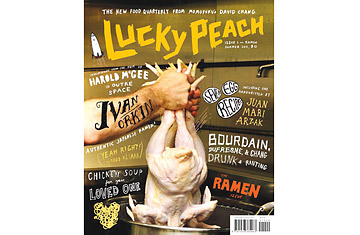
The first thing you need to know about Lucky Peach, a new food quarterly, is that it is cool. The magazine is a collaboration between two bastions of coolness so lofty, so impregnably self-assured, that even the most derisive, self-hating hipster can't find a way to scorn it without making it seem even cooler. One of these bastions is McSweeney's, the most immaculately styled, pitch-perfect, self-satisfied American publishing phenomenon since the early days of the New Yorker, and the other is David Chang, the charismatic enfant terrible of American gastronomy. The quarterly gets its name from Chang's restaurant group, Momofuku, which is Japanese for "lucky peach" and also the first name of the inventor of instant noodles.
Because I, like so many of Chang's and McSweeney's fans and followers, simultaneously admire and despise them, I wanted to dislike Lucky Peach. Moreover, I had skin in the game: Chang and I have had a laughably public feud over the years, and my desire to see him overreach himself was almost as great as my annoyance at having to admit how great Lucky Peach really is.
It really is great. There's no question its preciousness quotient is off the charts: the magazine includes concert-poster-style woodcuts of Tokyo ramen deities, a recipe for corn with miso butter written entirely in haiku and an appreciation of regional potato chips by the former bassist from Pavement and Sonic Youth, Mark Ibold. The magazine's visual style is like a cross between The Art of Eating, Vice and an exhibition catalog. The air of irreverence, of brilliant and privileged youths indulging their fixations, brings to mind the smarmy young Charles Foster Kane, talking a mile a minute and laughing off his losses of a million dollars a year. Lucky Peach lives on that magical, ephemeral plane. Unlike Citizen Kane's newspaper, I can't imagine Chang's publication will last long, at least not in its present form. Despite two sold-out runs, Lucky Peach doesn't seem to have a single paid advertisement in its 174 thick, full-color pages.
That's O.K. with me. I'm just along for the ride. The reader isn't expected to buy or watch or cook or do anything other than luxuriate in the awesomeness of this magazine. I have no special enthusiasm for ramen noodles, the theme of the debut issue's compulsive attentions, but I felt a profound, vicarious thrill in its illustrated guide to varieties of ramen; its recipe for alkaline noodles by food-science guru Harold McGee; its review — by Ruth Reichl, no less, one of Chang's many godmothers in the media — of an obscure variety of instant noodles; its pictorial guide to egg doneness; and its long and thoughtful essay debunking authenticity by the critic Todd Kliman. Like its cousin McSweeney's, its best feature is its style, a starry state of mind that its readers reflexively wish to emulate, even if only in a passive way, by internalizing it as their own. Unlike McSweeney's, though, which is airlessly ironic and alienating even to its fans, Lucky Peach is powered by the fiery ardor and violent attachments of its presiding spirit.
There is no way to read Lucky Peach and not want to be a part of the Church of Chang. Not so much because of David Chang personally, but because of all the energy and virility and obsessive erudition that has surrounded him over the past few years. Much of the book's spirit comes from Chang's brilliant collaborator, Peter Meehan, an even odder bird than Chang himself, but also a food writer so lucid and intelligent that he makes other food writers jealous. His longest piece in the magazine, a first-person travelogue about a gastronaut's expedition to Japan with Chang, strikes an ideal balance between a totally selfless and scholarly obsession with ramen and, along the way, the presence of Chang, who appears not as a bad-boy celebrity chef but merely as an appreciator and a student — two of his best qualities, I think, and ones frequently overlooked in discussing his success.
I expected Lucky Peach to be merely a Chang star vehicle, Tiger Beat for his cult. Instead, it's a masterpiece of modern-food culture. And yet, it couldn't have happened without his strange stardom. It's just so strange. No one is more ambivalent about the two aspects of his character than Chang himself; he purports to despise media hype, but just the other night, he was on Jimmy Kimmel Live, doing a ramen hangover cure. But even Chang himself, it would seem, can't escape the cult of cool. And why would he — or anybody — want to? Chefs are public figures today; without a patina of stardom, they are just middle managers or small-business owners, counting the days until they get fired or go out of business. The times have been good to Chang. And, to be fair, using Lucky Peach as just the latest example, Chang has been pretty good to us too.
Ozersky is a James Beard Award—winning food writer and the author of The Hamburger: A History. He is currently at work on a biography of Colonel Sanders. Taste of America, Ozersky's food column for TIME.com, appears every Wednesday.
